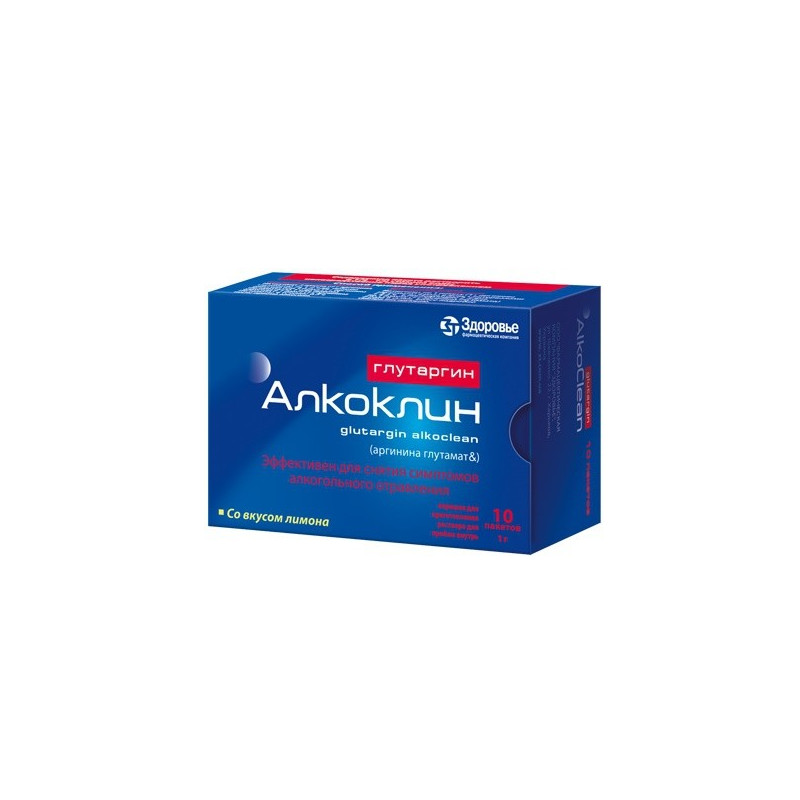



 All payments are encrypted via SSL
All payments are encrypted via SSL
 Full Refund if you haven't received your order
Full Refund if you haven't received your order
1 pack contains arginine glutamate (in terms of 100% substance) 1.0 g;
Excipients: Glycine, mannitol (E 421), anhydrous citric acid, ac-partam (E 951), “Lemon” flavoring.
Glutargin is a salt of arginine and glutamic acid. When alcohol intoxication stimulates the utilization of alcohol in the monooxygenase system of the liver, prevents the inhibition of the key enzyme ethanol utilization - alcohol dehydrogenase; accelerates the inactivation and elimination of toxic products of ethanol metabolism as a result of an increase in the formation and oxidation of succinic acid; reduces the depressant effect of alcohol on the central nervous system due to the neurotransmitter properties of excitatory glutamic acid. Due to these properties, Glutargin exhibits antitoxic and sobering effects.
Glutargin also has hypoammonoemic and hepatoprotective properties due to the activation of the process of neutralization of ammonia in the body, antioxidant, antihypoxic and membrane stabilizing effects, and has a positive effect on the energy supply processes in hepatocytes.
Glutargin does not have embryotoxic, gonadotoxic, mutagenic and teratogenic effects, does not cause allergic and immunotoxic reactions.
Prevention of intoxication and the hepatotoxic effect of alcohol. Treatment of acute alcohol intoxication of mild and moderate severity, as well as in the complex therapy of post-toxic disorders after acute severe alcohol poisoning.
The drug is prescribed for adults inside, after dissolving the package in ¼-½ cup of water.
For the prevention of intoxication and the hepatotoxic effect of alcohol, 2 g (2 packages) are prescribed 1-2 hours before taking alcohol or 1 g (1 package) 1 hour before taking alcohol and 1 g (1 package) within 0.5 hours after taking of alcohol. For the treatment of acute alcohol intoxication of mild and moderate severity, 1 g (1 bag) is prescribed 4 times a day at intervals of 1-2.5 hours, and in the next 2-3 days, 1 g (1 bag) 2 times a day. When alcohol intoxication is severe, Glutargin powder is prescribed 1 g (1 pack) 2 times a day for 20 days as part of complex therapy after a course of treatment with Glutargin injection drugs.
- Use during pregnancy or breastfeeding. The safety of the clinical use of the drug in the I and II trimester of pregnancy and breastfeeding has not been studied.
- The ability to influence the reaction rate when driving vehicles or other mechanisms. Does not affect.
- Children. The efficacy and safety of the drug in childhood and adolescence has not been studied.
Rarely, there may be a feeling of mild discomfort in the area of the gastrointestinal tract and nausea immediately after the use of the drug, which pass away on their own.
The effect of Glutargin on insulin secretion increases with simultaneous appointment of aminophylline. Glutargin may enhance the effect of anti-aggregation agents (dipyridamole, etc.). Warns and weakens neurotoxic effects that may occur with isoniazid. Weakens the effect of vinblastine.
Relative contraindications are fever, increased excitability, severe violations of the filtration (nitrogen-separating) kidney function.
Symptoms: nausea, vomiting, abdominal pain, loose stools, allergic reactions, chills, short-term hyperthermia and / or hypotension, central nervous system, insomnia.
Treatment: Depending on the severity of clinical symptoms - the use of Activated carbon, symptomatic treatment, if necessary, antihistamine therapy.
Store in original packaging at a temperature not higher than 25 ° C. Keep out of the reach of children.
